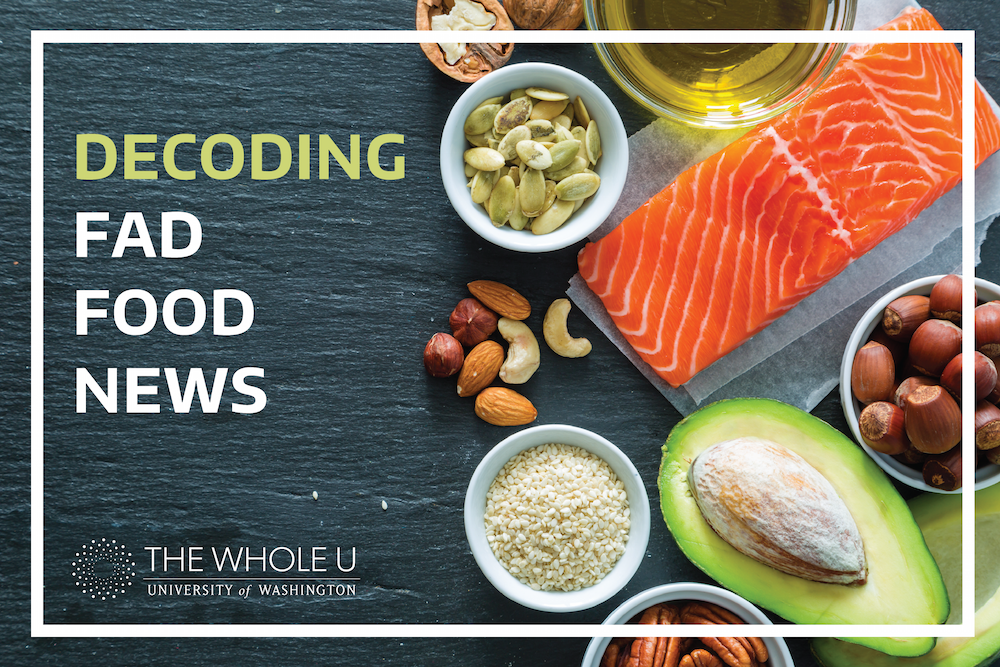
Deciphering the Hype of Fad Food News
When was the last time you saw a news segment about the latest super food, or listened to an infomercial promoting the most up-to-date transformative diet? When was the last time you were in a grocery store and found yourself surrounded by the dozens of herbal and vitamin supplements, each one with a label boasting about the medical benefits? How many of your Facebook friends posted about the health benefits of drinking coffee with butter?
Every day, we are bombarded with nutrition messages. How do we make educated choices about which voices to listen to? Sometimes, it can be as important to be as mindful about our media diet—the nutritional news we consume—as we are about diet itself.
First and foremost, it’s important to pause and remind oneself that headlines are written to catch our attention and to garner more “likes” or to cause us to stop and pause our channel-flipping, web-scrolling ways. Because the goal of the headlines is to catch our attention ahead of delivering information, those headlines may not tell the whole story.
As a dietitian, there are three primary questions I consider when assessing the latest fad food or supplement. Being mindful these strategies will help you cut through the hype and figure out what’s right for your unique diet and nutritional needs.
1. What is the scientific basis for the headline, and under what circumstances was the research performed?
One of the biggest challenges with nutrition science is the ability to perform good research. Because everyone needs to eat and we all eat a variety of foods, it can be tough to isolate the benefits from one particular food item. Many articles include a link to the original research publication.
It can feel overwhelming to try to read the whole publication, but the short overview of the research done or the abstract paragraph at the beginning of a journal article can provide a wealth of information. Did the researchers base their findings using animals as a study’s subjects? Did the subjects eat a large quantity of food—i.e. the equivalent of fifty carrots—to see the benefit? How many people were in the study? Were the people in the study similar to myself, or do they live a different lifestyle (i.e. different age, country, disease state, etc.)?
2. Who funded the research?
There have been many reported instances regarding conflict of interest with food companies and their advertising or publication techniques. One such example is Coca-Cola claiming that soda consumption does not lead to obesity or diabetes risk. Even sources such as the Dietary Guidelines for America can be at risk for lobbying by the food industry.
While we do not necessarily need to throw out all of the research performed by food companies, it is important to take the results with a grain of salt. This information may not be readily available in a given news article, and may require more investigation within the original research publication.
3. Do my nutrition goals and needs align with the potential benefits of this “super” food or supplement?
Assess your own health factors and ask yourself informed questions before embarking on any new nutritional regimen. If I have diabetes, does it make sense to eat cases of blueberries to try to reduce cancer risk, even though I know it’ll raise my blood sugar? If I need to watch how much fluid I drink to protect my heart, kidneys, or liver, should I drink a liter of coconut water? If I need to follow an immunocompromised diet, is it okay for me to add miso or other fermented foods to my diet? These are important questions to ask your medical provider and/or dietitian.
If you do not have a medical condition requiring specific nutrition restrictions, then it is important to weight the potential risks and benefits of the “super” food or supplement for your lifestyle. A plant-based diet with moderate portion sizes and limited processed food is generally a good diet to follow.

After thinking through the above points, there is still likely going to be room for interpretation.
If you have questions, consider asking your doctor for a referral to see a registered dietitian (RD), and ask what nutrition services your insurance may cover. No matter from whom you are receiving information, it’s important to ask questions, assess for bias, and consider whether the food or supplement is appropriate for your situation at a given time.
Tina Hayashi is a registered dietitian, certified specialist in oncology nutrition, and certified nutrition support clinician at Harborview Medical Center. In her free time, she enjoys baking, crafting, and exploring the Pacific Northwest.
3 Thoughts on “Deciphering the Hype of Fad Food News”
On July 6, 2017 at 10:12 AM, Nancy Langley said:
Great job on this article, Tina!!!
On January 8, 2020 at 9:28 AM, George Thomas, Jr. said:
Always “follow the money” and consider the source of the information.
On January 9, 2020 at 8:37 AM, Francine said:
Especially timely at the onset of the New Year when weight loss resolutions are prominent – this is a key reminder to be cautious and discerning – thank you for sharing
Comments are closed.